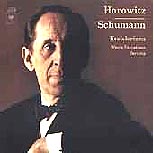Robert Schumann’s mercurial creative voice found an interpretive soulmate in Vladimir Horowitz, whose own high-strung temperament and bel canto lyrical bent are nothing if not, well, Schumann-esque. His 1969 Kreisleriana recording remains a point of reference for superbly delineated and infinitely varied textures, perfectly gauged shifts of mood and pace, and quivering harmonic tension in each movement. Even when Horowitz takes rhythmic liberties, such as slightly rushing certain bass notes in the finale, they always seem to enhance rather than pull focus from Schumann’s intent. The lovely Clara Wieck Variations have a sense of calm and repose that eluded the pianist in his earlier 1951 RCA version, and are less overtly rhetorical than his later readings.
Horowitz’s 1968 Arabesque, recorded live at Carnegie Hall, contains tapered phrasings and coy diminuendos absent from his more flowing, straightforward 1962 studio counterpart. His febrile romp through the Toccata features deft polyphonic manipulations that make the music sound less thick and notey than usual, at the expense of several technical blemishes (smudged chords in the coda, snatched-at broken 10ths at the start of the development section). But the rarely heard Blumentstück and hackneyed Träumerei ideally exemplify the pianist’s gold-spun legato and ravishing use of the sustain pedal. Sony’s remastering yields results that are a little rounder and fuller sounding than the 1993 Complete Masterworks Recordings edition. The differences however are minuscule, and if you already own the earlier reissue there’s no need to replace it.
































